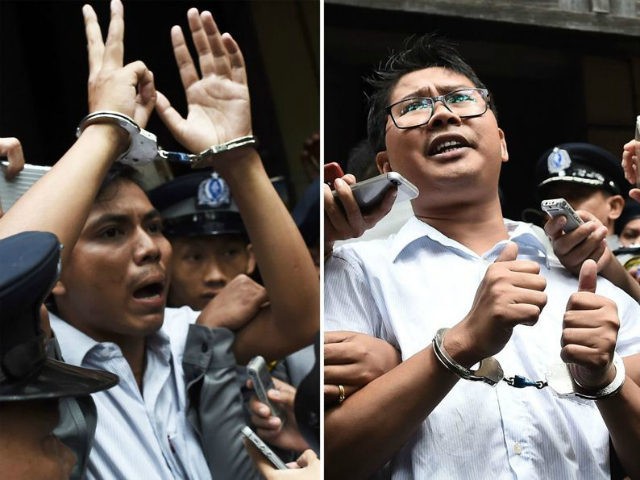Reuters reporters Wa Lone and Kyaw Soe Oo, detained in Myanmar since December, were sentenced to seven years in prison on Monday for “exposing state secrets” in their reporting on the massacre of Rohingya Muslims.
AFP reported on Monday that the reporters claim they were set up by Myanmar police while preparing an expose on the extrajudicial killings of ten Rohingya last year:
They said they were arrested after being invited to dinner by police in Yangon who handed them documents. As they left the restaurant, the pair were detained for possessing classified material.
Judge Ye Lwin was unmoved by their testimony. “It is found that the culprits intended to harm the interests of the state. And so they have been found guilty under the state secrets act,” he told the packed Yangon court.
“They are sentenced to seven years in prison each.”
As they were led to the waiting prison van the handcuffed duo, both Myanmar nationals, gave brief but emotional statements on the court steps.
“The government can detain us in the prison but… don’t close the ears and eyes of the people,” Kyaw Soe Oo said.
Wa Lone who gave a defiant “thumbs up” to the masssed ranks of reporters, said “we will face it (the verdict) with stability and courage.”
Military officials in Myanmar do not contest the killings of the Rohingya but claim it was “a one-off act of abuse by a mix of security forces and ethnic Rakhine locals,” as AFP put it.
The United Nations disagrees. A U.N. panel last week recommended prosecuting Myanmar military chief Gn. Min Aung Hlaing and five other top generals for genocide, describing the operation in Rakhine province as a “foreseeable and planned catastrophe.” The panel described brutal operations designed to destroy entire villages and organized atrocities, including mass rape and murder.
U.N. human rights chief Michelle Bachelet said on Monday she was “shocked” by the prison sentences handed down to the Reuters journalists.
“The trial was a travesty of justice. I urge Myanmar to immediately and unconditionally release Kyaw Soe Oo and Thet Oo Maung,” Bachelet said.
“Today is a sad day for Myanmar, Reuters journalists Wa Lone and Kyaw Soe Oo, and the press everywhere,” Reuters Editor-in-Chief Stephen J. Adler said on Monday.
Adler saw the verdict as a blow against democracy and the rule of law:
These two admirable reporters have already spent nearly nine months in prison on false charges designed to silence their reporting and intimidate the press.
Without any evidence of wrongdoing and in the face of compelling evidence of a police set-up, today’s ruling condemns them to the continued loss of their freedom and condones the misconduct of security forces.
This is a major step backward in Myanmar’s transition to democracy, cannot be squared with the rule of law or freedom of speech, and must be corrected by the Myanmar government as a matter of urgency.
Adler’s statement indicated Reuters will continue to fight for the freedom of its reporters and may “seek relief in an international forum” in addition to filing appeals in Myanmar.
The United States, European Union, and several individual European governments also called for the release of the imprisoned reporters. Reuters quoted the profound disapproval of the U.S. and British ambassadors to Myanmar, who were present at the sentencing hearing:
Scot Marciel, US ambassador to Myanmar, said he was “sad for Wa lone and Kyaw Soe Oo and their families, but also for Myanmar.”
“It’s deeply troubling … one has to ask will this process increase or decrease the confidence the people of Myanmar have in their justice system,” he said.
Dan Chugg, British ambassador to Myanmar expressed extreme disappointment and lambasted presiding Judge Ye Lwin over the verdict.
“The judge has appeared to have ignored evidence and to have ignored Myanmar law. This has dealt a hammer blow for the rule of law,” he said.
AFP quoted outraged responses from human rights organizations around the world:
The ruling “sends a stark warning to other journalists in the country of the severe consequences that await should they look too closely at military abuses,” Amnesty International’s Tirana Hassan said in a statement.
“This amounts to censorship through fear.” Frederick Rawski of the International Commission of Jurists described it as a miscarriage of justice following a “grossly unfair” hearing, citing the lack of evidence and violations of the right to a fair trial.
Reporters Without Borders condemned the “sham trial” and sentencing as a “dark day for press freedom in Myanmar.”
Human rights activists are heartsick over the role played in the Rohingya atrocity and persecution of journalists by Myanmar’s civilian leader, President Aung San Suu Kyi, a Nobel Peace Prize laureate whose own imprisonment by the previous government of Myanmar was an international outrage for many years.
The civilian president of Myanmar does not directly control the military, but it was hoped Suu Kyi’s administration would mark the beginning of a transition to health constitutional democracy. Instead, the president’s longtime admirers are aghast at her quiet complicity.
“The army still rules the country. … Suu Kyi has betrayed us,” reporter Lawi Weng, himself imprisoned for two months last year, told the Globe and Mail.
On Monday, the BBC noted that campaigns are in progress across Europe to strip Suu Kyi of humanitarian honors awarded when she was seen as a beacon of democracy. Most recently, a motion was introduced to remove a plaque honoring Suu Kyi from Hazlehead Park in Aberdeen.
As for the most renowned of those honors, the Nobel Committee stated last Wednesday that her Nobel Peace Prize will not be rescinded because there is “no provision” for doing so.

COMMENTS
Please let us know if you're having issues with commenting.